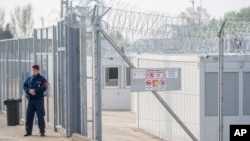The U.N. refugee agency (UNHCR) on Monday urged European Union members to temporarily suspend transfers and returns of all asylum seekers to Hungary.
UNHCR said the situation in Hungary has gotten worse since the country's new policy to detain new asylum seekers, including children, in shipping containers surrounded by high razor fences at the border for the entire time of their asylum procedures.
According to a U.N. statement, as of April 7, there were 110 people, including four unaccompanied children and children with their families, held in shipping containers.
Hungary's policy also includes deporting any migrants who do not hold official papers.
The United Nations position comes after Hungary passed a law on March 28 for tougher immigration stances that led to the building of camps.
"The situation for asylum seekers in Hungary, which was already of deep concern to UNHCR, has only gotten worse since the new law introducing mandatory detention for asylum seekers came into effect," said Filippo Grandi, United Nations High Commissioner for Refugees.
Reports say the unusual move will bring more attention on Hungarian Prime Minister Viktor Orban's government, which has been condemned by rights groups on its strict policies on migrants.
"While acknowledging the authorities' recent efforts to address police violence, we remain very concerned about highly disturbing reports of serious incidents of ill-treatment and violence against people crossing the border into Hungary, including by State agents," Grandi said.
"These unacceptable practices must be brought to an end and I urge the Hungarian authorities to further investigate any allegation of abuse and violence," he added.
The United Nations urged EU members to suspend migrants' return under the Dublin regulation, a rule that says any asylum seekers must have their cases handled in the first EU country they have entered, and should be returned there if necessary.
Grandi said the suspension should continue, "until the Hungarian authorities bring their practices and policies in line with European and international law."
"It is important that asylum systems, as well as reception conditions, are further improved in many EU and candidates States. This will help reduce irregular onward movements and the increasing reliance on smugglers. It will also help to reduce current pressure at the Hungary's southern border," Grandi said.






